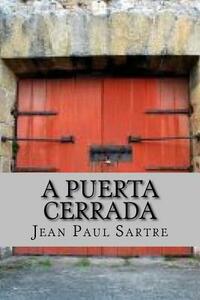Take a photo of a barcode or cover
Brilliant funny and one that’ll sit in your brain for days after you put it down. Would love to see a production of this play.
Après avoir lu des oeuvres philosofiques de Sartre, cette pièce m'a plu vraiment beaucoup. Outre à la signification profonde de la pièce ('' l'enfer, c'est les Autres ''), les personnages sont tous très drôles.
I love this show especially being a post WW2 story. If you love The Good Place, it is a good play for you!
challenging
dark
medium-paced
Plot or Character Driven:
Plot
Strong character development:
No
Loveable characters:
No
Diverse cast of characters:
No
Flaws of characters a main focus:
Yes
Hell is—other people.
I read this in one sitting and I’m surprised that I hadn’t heard of or read any Jean-Paul Sartre beforehand; his existential displays in play format are very captivating. Philosophy is something I’ve been loving more and more as time goes on and as I realize so much of the media I consume is soaked in philosophical concepts. Though this is a play with a very thin narrative, it’s much more of a demonstration of Sartre’s perception of Hell—or what Hell can be. He pokes at the irony of our preconceived notions towards the kind of torment we would expect; isolation with fire sticks and blades for eternity. Though to Sartre, Hell is a room with no windows, filled with three people. The torment lies in the juxtaposition between the people, but it reflects how much ourselves lie in the face of presenting the ‘good’ in us. After awhile, regardless of how much you love the person—and this can be love in many different types of ways—you begin to loathe them. The forced candidness of this ‘room’ would drive anyone to wanna kill another person. But why is it that when Garcin is offered the chance to leave the room, he doesn’t? Does the affection from Estelle justify the verbal abuse from herself and Inez, for which Garcin finds it better to stay? The closing lines of the play go like this, “Well, well, let’s get on with it…”; as the three sit in their own couch directed at each other, Garcin says what not only Estelle and Inez are thinking, but the reader as well. There are many questions that form from reading this and right there lies the beauty of philosophy to me; the only answer is the one that makes you a better person tomorrow. In the case of ‘No Exit’, I’ll have to ponder on that for a long, long time
I read this in one sitting and I’m surprised that I hadn’t heard of or read any Jean-Paul Sartre beforehand; his existential displays in play format are very captivating. Philosophy is something I’ve been loving more and more as time goes on and as I realize so much of the media I consume is soaked in philosophical concepts. Though this is a play with a very thin narrative, it’s much more of a demonstration of Sartre’s perception of Hell—or what Hell can be. He pokes at the irony of our preconceived notions towards the kind of torment we would expect; isolation with fire sticks and blades for eternity. Though to Sartre, Hell is a room with no windows, filled with three people. The torment lies in the juxtaposition between the people, but it reflects how much ourselves lie in the face of presenting the ‘good’ in us. After awhile, regardless of how much you love the person—and this can be love in many different types of ways—you begin to loathe them. The forced candidness of this ‘room’ would drive anyone to wanna kill another person. But why is it that when Garcin is offered the chance to leave the room, he doesn’t? Does the affection from Estelle justify the verbal abuse from herself and Inez, for which Garcin finds it better to stay? The closing lines of the play go like this, “Well, well, let’s get on with it…”; as the three sit in their own couch directed at each other, Garcin says what not only Estelle and Inez are thinking, but the reader as well. There are many questions that form from reading this and right there lies the beauty of philosophy to me; the only answer is the one that makes you a better person tomorrow. In the case of ‘No Exit’, I’ll have to ponder on that for a long, long time
challenging
mysterious
reflective
slow-paced
reflective
challenging
dark
emotional
reflective
tense
medium-paced
Plot or Character Driven:
Character
Strong character development:
Complicated
Loveable characters:
No
Diverse cast of characters:
Yes
Flaws of characters a main focus:
Yes



